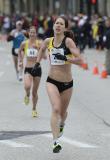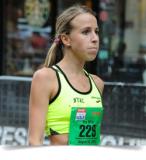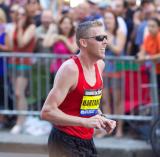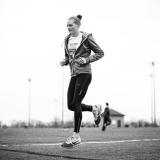Folders |
TF360: Jason Hartmann Tackles the Marathon "On Feel"Published by
Getting Ready for BostonBy Scott Bush - Click Here for all TF360 Archives Like so many other marathoners, the Boston Marathon holds a special place in the heart of Colorado-based Jason Hartmann. Having finished fourth the past two years, the tall and lanky distance standout is ready to roll on the roads once again, feeling strong from a great training block and confidence from his past performances. We caught up with Hartmann right before Monday's marathon, discussing his latest training, how he stays relaxed in the build-up, his secrets to marathon success, the love for his late dog Max and so much more. This is a must read before tomorrow's big event! Follow Jason: Twitter Scott Bush (SB): Boston is right around the corner. How are you feeling? Jason Hartmann (JH): I am feeling confident to put my best effort out on the course. I've had some great workouts and I am the kind of runner who takes confidence from consistent training, and piecing it together well. SB: You've finished top four twice now in Boston. Are you approaching this year's race in similar fashion to the past two races? JH: I am. I never go out there with a set pace that I intend to run based on training, but rather, I go out and run "on feel". I have found that for me, that is how I race the marathon or distance events best -- racing "on feel" and reading my body and reading the race as I go, when it comes to the weather, the pace, etc. SB: With so much emotion wrapped up into this year's Boston Marathon, how are you mentally preparing for the weekend and the race? JH: Coaching others actually helps me stay out of my own head until the morning of the race, and just focus on what I need to do each day approaching the race, and until then, focusing on the athletes I coach and taking joy in seeing them compete to the best of their ability each time out. SB: Have you done anything different in the lead up to this year's event compared to your last marathon build-up or two? JH: I try to get better each training block with regard to nutrition, with regard to sleep, etc. I still incorporated a good deal of cross training, thanks to RallySport Boulder, and found that Rob Barber in Boulder is a great massage therapist as well. My healthy eating habits improved a bit more since last time, and I fine-tuned prior training, and even incorporated some new trails and runs in this training block. I explored a bit more using some trails and training grounds in Golden and Denver, Colorado, as well as in Boulder and Nederland this time around. It added some freshness to my training. SB: I know you do a bunch of your training on your own, but who else are your training with from time to time these days? JH: Occasionally I'll jump in with Brad Hudson's group or Steve Jones' training group and get a workout in with Patrick Rizzo, Tyler McCandless, or Brent Vaughn. Those guys are awesome. Sometimes an easy run with Kenyon Neuman or Ramin Ragavi or Mark DelMonaco. There's no shortage of talent in Colorado to run with. SB: Has your sponsorship situation changed at all over the past 6-8 months? JH: No, but I have appreciated RallySport Boulder, Boulder Running Company, 110%, and PowerBar's constant support when it comes to gear and in-kind sponsorship. SB: You've been around the block a number of times now when it comes to the marathon. What are one or two things you feel you've learned along the way that really stands out? JH: There's a ton-- the marathon truly is such a learning experience. A couple of them include: 1) When you live at altitude, training in an altitude tent just compounds fatigue and overall tiredness levels with training and it doesn't support strong performances. 2) The race isn't made in the first 5k nor in the first 10k. Creating a relationship with your body and understanding when to listen to your body's feedback regarding how you feel vs. when to block out the little voice in the back of your head that desires comfort vs. excellence and whispers "stop" when your heart whispers "keep going". 3) Knowing the perfect racing shoe that works for you for the marathon distance in order to avoid dreaded blisters... what you can "tough it out" for in a 5k or 10k (such as a common cold or dehydration headache or bad blister) is completely different from what you can "tough out" or "work through" for a marathon. The marathon is a different animal. 4) I have to train for a specific race course, and not just for the marathon particular distance. 5) You have to draw just as much energy from the crowd and from the race itself as you do from your internal motivation and from the individuals you're dedicating your race to. SB: So many people focus on mileage when they are training for a marathon, but what do your core/weight, nutrition and sleep routines look like? JH: Proper iron, omega 3, fish oil, beet juice, juice plus, red meat, and vitamin C consumption considerably assist in the immune system being strong and the body prepared on race day. I keep my blood sugar level up by eating something every 4 hours. When I wake up, I always eat before my first run, something light, with coffee. I always take my iron and beet juice and vitamin C source before bed so that I don't have to worry about it affecting me pre-run. This training block, I really tried to eat out less for breakfast and lunch (minus post-long run breakfast outings-I love those) and stick to my budget, and cook more for dinners and only eat out if I was in a time crunch. I think that helped with my big nutrition focus because I always knew exactly what I was putting into my body. I am actually a very, very light sleeper and it took me a long time to figure out a good balance of proper hydration where I wasn't waking up every 4 hours, interrupting good REM sleep, to go to the bathroom. I still probably wake up once, sometimes twice a night to go to the bathroom because I drink water all day long, everyday, but my sleep is better when I sleep in my own memory foam mattress, when the room is cold, and when I learn to compartmentalize thoughts and just shut off as soon as the clock hits 9:30pm and get in the bed whether I'm tired yet or not. I miss sleeping with my Rottweiler. He used to take up half of the bed and I used to wake up in the middle of the night and have to kick him out of the bed because he was panting so hard, and then early in the wee hours of the morning, he would climb back into the bed anyhow, and I'd wake up and we'd be cuddling. I loved that dog so much it hurts to sleep without him--it's a strange void--and that made sleeping even harder for a long time after I lost him to cancer in September of 2013. I use the physiostability ball for a lot of core as well as change up my routines periodically to address strength in various areas of my body. I go to RallySport Boulder to do core and weights, and have changed up my routines to address the areas of my body I had been getting very sore in (hamstrings, lower and upper back). SB: In your mind, what's been the most challenging part of your marathon build-up to Boston? Doing it without my favorite training partner- my Rottweiler who died of cancer in September 2013. He used to do all of my double day runs with me. He was my dog-child. He was my reason to not be selfish--to have someone else that I always thought of before myself. Dogs love us in a way people never can- unconditionally-- where you want to live up to the person they think you are. For awhile, I had a really hard time getting out the door to run when the vet told me he had only a few weeks to live, because I was scared I would go for a trail run, and I would come home, and THAT would be the day that he died. On that run. I had major anxiety for a long time, waiting for the day that would hurt more than I ever imagined I could ever hurt inside. The first run where he had to drop off and couldn't finish, he had always been so tough, he would never fall off...the first time that happened I broke down because I knew he was in pain and I didn't want my dog to be in pain and to be suffering. When I finally had to put him down, a part of me died inside too. Doing this without Max has been the most challenging part of my marathon build up to Boston. More news |








